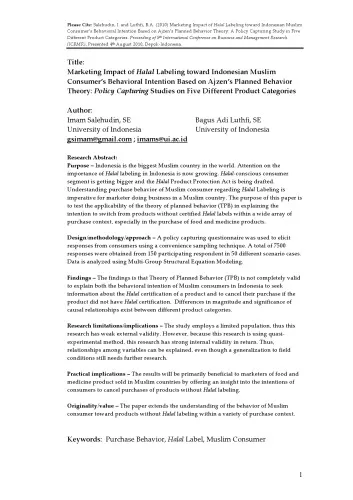Marketing Impact of Halal Labeling toward Indonesian Muslim Consumer’s Behavioral Intention Based on Ajzen’s Planned Behavior Theory: Policy Capturing Studies on Five Different Product Categories
3.7
Reviews from our users

You Can Ask your questions from this book's AI after Login
Each download or ask from book AI costs 2 points. To earn more free points, please visit the Points Guide Page and complete some valuable actions.Introduction
In today’s interconnected global economy, consumer behavior is becoming increasingly multifaceted, influenced not only by cultural and social norms but also by religious values. For Indonesia, the country with the world's largest Muslim population, the demand for halal products—goods and services permissible under Islamic law—has skyrocketed. This phenomenon is not only reshaping local markets but also influencing international trade policies. My book, "Marketing Impact of Halal Labeling toward Indonesian Muslim Consumer’s Behavioral Intention Based on Ajzen’s Planned Behavior Theory: Policy Capturing Studies on Five Different Product Categories," explores this dynamic interplay between halal certification and Muslim consumer behavior. By using Ajzen’s Theory of Planned Behavior (TPB) as a theoretical framework, this work sheds light on how halal labeling impacts consumer decision-making in Indonesia across different product types.
This examination is especially crucial because businesses aiming to penetrate Indonesia’s vibrant consumer market need to fully understand the significance of halal labeling. The book makes significant contributions to marketing, consumer psychology, and socio-religious studies by leveraging a data-driven approach in identifying the behavioral drivers of Indonesian Muslim consumers. The policy capturing methodology employed across five diverse product categories ensures the findings are robust and applicable to real-life marketing processes. Whether you are an academic researching consumer behavior, a marketing professional targeting Muslim consumers, or simply a curious reader, this book provides actionable insights and theoretical perspectives on the growing relevance of halal marketing and labeling.
Comprising thoughtful analysis, quantitative research, and engaging discussion, the book captures the pulse of an evolving market where religious compliance meets consumer behavior dynamics. It not only highlights how halal labeling boosts purchase intention but also reveals how perceived behavioral control, subjective norms, and attitudes impact decision-making across various product types. Let’s delve deeper into what this book offers by exploring its detailed summary, key takeaways, memorable quotes, and its broader importance.
Detailed Summary
The book provides an extensive overview of how halal labeling influences Indonesian Muslim consumers by examining five distinct product categories: food, beverages, cosmetics, pharmaceuticals, and fashion. The core theoretical framework employed in this research is Ajzen's Theory of Planned Behavior (TPB), which postulates that human behavior can be predicted through three factors: attitudes, subjective norms, and perceived behavioral control. By analyzing these factors, I investigate consumer intentions to purchase halal-certified products within the context of Indonesian society.
Using policy capturing studies, the research highlights significant differences in how halal certification matters across industries. For instance, halal labeling was found to have the highest impact on food and beverages, while its influence in categories like cosmetics and fashion, though present, was less pronounced. The results also reveal that attitudes toward the importance of halal certification and societal pressures heavily influence purchase decisions, creating a nuanced picture of consumer behavior where religious adherence meets practical needs. By blending theoretical insights with empirical data, the book serves as a critical touchstone for understanding halal consumerism in Indonesia.
Key Takeaways
- Halal labeling enhances consumer trust and directly impacts purchase intention, especially in products deeply connected to consumption like food and beverages.
- Ajzen’s Theory of Planned Behavior (TPB) provides a robust framework for predicting consumer decision-making in a religiously motivated market like Indonesia.
- Subjective norms, or societal pressures, significantly influence halal product purchases, indicating the role of community in shaping individual consumer choices.
- Marketing strategies tailored to emphasize halal certification can exponentially increase a brand’s competitiveness, especially in Muslim-majority countries.
- The policy capturing methodology ensures practical, real-world applicability of research findings across various industries.
Famous Quotes from the Book
"Halal certification is not merely a label; it is a declaration of trust and a bridge connecting businesses to consumer faith and values."
"Indonesian Muslim consumers live at the intersection of religious responsibility and global consumerism, making halal labeling an essential marketing tool."
"By aligning with religious principles and market expectations, halal labeling transforms from a compliance protocol into a competitive advantage."
Why This Book Matters
The significance of this book lies in its ability to fill the knowledge gap on how halal certification influences consumer behavior, especially in the rapidly expanding market of Indonesia. As the demand for halal products grows, businesses increasingly recognize the need for strategies aligned with Islamic principles. This book provides the tools and frameworks to navigate these waters, making it indispensable for marketers, policymakers, and researchers alike.
Moreover, the use of Ajzen’s TPB ensures that the findings are not only applicable to the Muslim consumer segment but are also grounded in widely accepted behavioral science perspectives. This interdisciplinary approach enhances its utility across academic, commercial, and cultural domains. If you are looking to make sense of the burgeoning halal industry and its impact on consumer behavior, this book offers unparalleled depth and clarity.
Free Direct Download
You Can Download this book after Login
Accessing books through legal platforms and public libraries not only supports the rights of authors and publishers but also contributes to the sustainability of reading culture. Before downloading, please take a moment to consider these options.
Find this book on other platforms:
WorldCat helps you find books in libraries worldwide.
See ratings, reviews, and discussions on Goodreads.
Find and buy rare or used books on AbeBooks.
1180
بازدید3.7
امتیاز50
نظر98%
رضایتReviews:
3.7
Based on 0 users review
"کیفیت چاپ عالی بود، خیلی راضیام"
Questions & Answers
Ask questions about this book or help others by answering
No questions yet. Be the first to ask!


